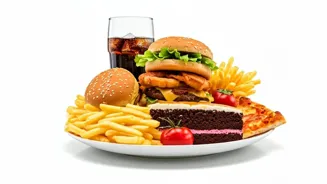The Cheat Day Concept
Cheat days are a planned part of a diet, where individuals consciously choose to deviate from their regular healthy eating plan. This typically involves
consuming foods or beverages that are usually restricted, such as sweets, fast food, or alcohol. The primary intention behind a cheat day is to allow for psychological relief from strict dietary rules, and to fulfill cravings. Those who include cheat days in their diet plans believe it can help them adhere to their diet long-term, providing a sense of freedom and preventing feelings of deprivation. The frequency of cheat days varies, often occurring once a week or every other week, depending on individual preferences and diet goals. It's important to plan cheat days strategically to align with overall health objectives and avoid excessive consumption that could counteract positive dietary effects.
Psychological Benefits
One of the biggest benefits of including cheat days is psychological. Strict adherence to a diet can lead to a feeling of being restricted or deprived. This can result in increased stress, which can lead to overeating or even abandoning the diet altogether. A scheduled cheat day provides a break from dietary rules and allows a person to satisfy cravings without guilt. This psychological freedom contributes to better adherence to the diet in the long run. By allowing the occasional indulgence, individuals are less likely to feel deprived. This can increase their motivation and the likelihood of sticking to a healthy eating pattern for longer periods. Cheat days create a sense of balance and help prevent dietary burnout. They can prevent the “all or nothing” mentality, where a small slip-up can lead to giving up entirely.
Metabolic Considerations
Cheat days can also have some potential metabolic effects, particularly for those following a calorie-restricted diet. One theory suggests that a well-planned cheat day could, at times, help boost metabolism, although this is not a simple solution. When calories are consistently restricted, the body can become more efficient at preserving energy, slowing metabolism. A cheat day, with its higher calorie intake, may counteract this effect. However, it is important to consider the quality of foods consumed during a cheat day. Consuming nutrient-poor, processed foods during a cheat day may not necessarily enhance the metabolic rate as it may not support metabolic function. Ultimately, the effect of cheat days on metabolism varies from person to person and depends on multiple factors. Therefore, it's crucial to consider individual metabolism and lifestyle factors.
Potential Downsides
Despite possible benefits, cheat days also come with potential downsides. Overindulgence is a common risk, leading to excessive calorie intake that can counteract the progress made throughout the week. This can result in weight gain or slow down weight loss. Another concern is the possibility of developing unhealthy eating habits. Regularly using cheat days can create a cycle of restriction and overeating. This can lead to an unhealthy relationship with food. Moreover, the types of foods consumed during cheat days often lack essential nutrients and may be high in sugar, unhealthy fats, and sodium. This can affect overall health. For individuals with certain health conditions like diabetes or high cholesterol, uncontrolled cheat days can exacerbate these conditions. Therefore, the approach to cheat days needs to be carefully planned to avoid falling into any of these traps.
Implementing Cheat Days
If someone decides to include cheat days in their diet plan, it's crucial to follow some strategies to ensure they're beneficial, not detrimental. Planning is key; choose the cheat day and the foods you will consume. This can prevent impulsive decisions and overeating. Set reasonable limits on the portion sizes and the types of food you consume. Avoid going overboard with high-calorie, nutrient-poor options. It's also essential to maintain awareness during cheat days. Practice mindful eating, pay attention to hunger and fullness cues, and stop eating when you are satisfied, not overly full. Balance is key; try to align cheat days with your overall dietary goals. This might mean planning them around social events where indulgence is expected. Also, remember to stay consistent with your regular exercise routine. It may help manage the extra calorie intake. By integrating these strategies, cheat days can become a sustainable and positive part of a healthy eating plan.
Making Informed Choices
Ultimately, the decision to include cheat days is a personal one. People should weigh the potential psychological benefits, as well as the potential risks. Before implementing cheat days, consider your health goals, current eating habits, and relationship with food. For those prone to overeating or with a history of disordered eating, cheat days might not be the best strategy. Instead, they might consider focusing on a flexible and balanced eating plan, without the rigid structure of cheat days. If you choose to include cheat days, it’s important to be mindful. Evaluate how cheat days affect your physical and mental health. If they consistently lead to negative outcomes, it might be time to reassess your approach. Consulting with a registered dietitian or a healthcare professional can provide personalized guidance. They can help tailor a plan that best suits individual needs and goals. This could involve advice about portion sizes, food choices, and strategies for avoiding overeating during the cheat days.













